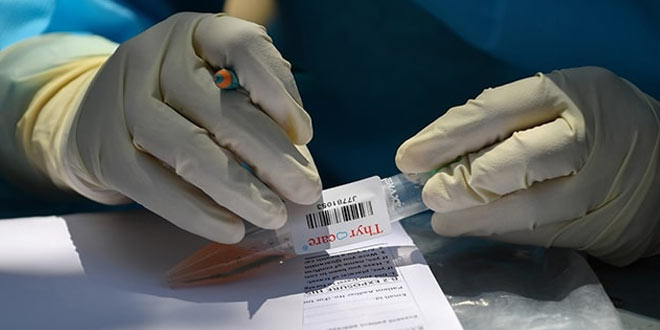Highlights
- Rapid tests are faster but considered as less accurate
- New tests provide reliable results in approximately 15 to 30 minutes: WHO
- High-income countries are carrying out 292 tests per day per 1 Lakh people
Geneva: The World Health Organization (WHO) and its leading partners have agreed to roll out 120 million rapid-diagnostic tests for the coronavirus to help lower- and middle-income countries make up ground in a testing gap with richer countries – even if it’s not fully funded yet. At USD 5 a piece, the antigen-based rapid diagnostic tests for which WHO issued an emergency-use listing last week, the program initially requires USD 600 million and is to get started as early as next month to provide better access to areas where it’s harder to reach with PCR tests that are used often in many wealthier nations, the WHO announced on Monday.
The rapid tests look for antigens, or proteins found on the surface of the virus. They are generally considered less accurate — though much faster — than higher-grade genetic tests, known as PCR tests. Those tests require processing with speciality lab equipment and chemicals. Typically that turnaround takes several days to deliver results to patients. WHO Director-General Tedros Adhanom Ghebreyesus hailed the program as “good news” in the fight against COVID-19.
These tests provide reliable results in approximately 15 to 30 minutes, rather than hours or days, at a lower price with less sophisticated equipment. This will enable the expansion of testing, particularly in hard-to-reach areas that do not have lab facilities or enough trained health workers to carry out PCR tests. We have an agreement, we have seed funding and now we need the full amount of funds to buy these tests, he said, without specifying.
Dr. Catharina Boehme, chief executive of a non-profit group called the Foundation for Innovative New Diagnostics, said the rollout would be in 20 countries in Africa, and would rely on support of groups including the Clinton Health Access Initiative. She said the diagnostic tests will be provided by SD Biosensor and Abbott. Peter Sands, the executive director of the Global Fund, a partnership that works to end epidemics, said it would make an initial USD 50 million available from its COVID-19 response mechanism. He said the deployment of the quality antigen rapid diagnostic tests will be a “significant step” to help contain and combat the coronavirus.
Also Read: A COVID-19 Test That Can Give Result in 30 Minutes, Awaits ICMR Approval
They’re not a silver bullet, but hugely valuable as a complement to PCR tests, since although they are less accurate, they’re much faster, cheaper and don’t require a lab, he said.
Many rich countries have also faced problems rolling out accurate tests, and testing itself is no panacea — countries like France and the United States have all faced backlogs and hiccups at times, and rapid tests in Britain and Spain turned out to be inaccurate. But rolling out testing in poorer countries aims to help health care workers get a better grip on where the virus is circulating, in hopes of following up with containment and other measures to stop it. Mr. Sands said high-income countries are currently carrying out 292 tests per day per 100,000 people — while the lowest-income countries were conducting 14 per 100,000 people. He said the 120 million tests would represent a “massive increase” in testing, but were still a fraction of what is needed in those countries.
Also Read: Health Ministry Launches Web Portal For Updates On COVID-19 Vaccine Development
(Except for the headline, this story has not been edited by NDTV staff and is published from a syndicated feed.)
NDTV – Dettol Banega Swasth India campaign is an extension of the five-year-old Banega Swachh India initiative helmed by Campaign Ambassador Amitabh Bachchan. It aims to spread awareness about critical health issues facing the country. In wake of the current COVID-19 pandemic, the need for WASH (Water, Sanitation and Hygiene) is reaffirmed as handwashing is one of the ways to prevent Coronavirus infection and other diseases. The campaign highlights the importance of nutrition and healthcare for women and children to prevent maternal and child mortality, fight malnutrition, stunting, wasting, anaemia and disease prevention through vaccines. Importance of programmes like Public Distribution System (PDS), Mid-day Meal Scheme, POSHAN Abhiyan and the role of Aganwadis and ASHA workers are also covered. Only a Swachh or clean India where toilets are used and open defecation free (ODF) status achieved as part of the Swachh Bharat Abhiyan launched by Prime Minister Narendra Modi in 2014, can eradicate diseases like diahorrea and become a Swasth or healthy India. The campaign will continue to cover issues like air pollution, waste management, plastic ban, manual scavenging and sanitation workers and menstrual hygiene.
[corona_data_new]



















